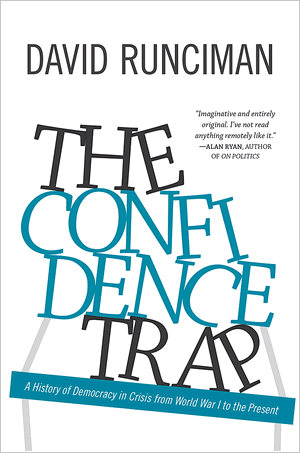Leadership Book Review
I’ve always found things happen not in threes, but in twos. Within a span of days I stumbled across two books, sharing some common characteristics, that are important reads for leaders.
Both are pithy, meaty books, whose authors make good arguments that counter common sense.
The Confidence Trap
By David Runciman, Princeton University Press. ISBN 978-0-691-14868-7

It’s an election year, municipally and provincially (remember?), so democracy is front-of-mind. LWR’s community-focused leaders practice democracy, in many sizes, on all levels.
Compared to trade, we know democracy less intimately. This book profiles the reasons why democracy lurches between success and failure.
The book is organized by years representing major crises in democracy, from 1918 (WWI and the Russian revolution) to 2008 (fiscal crisis). The stories are about nation states and global politics; Runciman uses “great man” history, invoking figures from de Tocqueville to Kissinger.
Runciman discounts moral merit or productivity and incentives, the common wisdom of democracy’s success. Democracy wins through an innate resiliance that hierarchy and autocracy don’t have. It fails because of the ‘Confidence Trap’: democracy knows it’s resilliant, and won’t avoid building up long-term problems safe in that knowledge.
The book is meaty, though the text is perfectly comfortable:
[Friedrich] Hayek wanted [the cold war] to be won by democracies that put their majoritarian powers beyond use. Instead, it was won by democracies that did not know what they were up to. … To take their mind off nuclear armageddon, they watched television and went shopping. And that’s how the cold war was won: by people whose attention was elsewhere.
This book has something to say local councils and boards. Democracy has traits that can be learned: is it good at external relations? Can it bluff? Runciman’s democracy is a graceful drunkard, unhurt in part because it didn’t entirely realize it was falling.
If pure-play democracy is your passion, The Confidence Trap has novel ideas to offer.
A Bigger Prize
By Margaret Heffernan, Doubleday Canada. ISBN 978-0-385-67983-1

Common wisdom is that competition makes for efficiency and the best possible outcomes. To hear some people talk about it, it’s somewhere between a Commandment and a Law of Physics.
Hefferman very capably differs. She catalogues the weaknesses and failings of competition, touring the world and speaking with researchers, business people, and families as only a television producer can.
These are arguments you’ve heard before—competition harms children, ruins romance and workplaces, kills customers and workers—but never so vividly. She fumigates the home, education, dating, the workplace, sports, and academia, sector by sector, of the false narrative of competition’s default superiority.
The text mixes, again, meaty research with television’s eye for human impact:
[O]n April 24, 2013, 1,127 garment workers, mostly women, died when their factory in Bangladesh collapsed on top of them. A day earlier, cracks had appeared in the building…but the company had tough production deadlines to meet; it wouldn’t get paid if the goods weren’t finished in time…photographer Shshidul Alam found a couple embracing each other, their torsos immersed in concerete. Blood ran from the man’s eyes, he said, like a tear.
Earlier this year, Thomas Piketty was all the rage, literally, for indicting capitalism (full disclosure: I haven’t read his 700 page book, and I’ll guess neither have you). This book should have had some share of that furor: Heffernan bolsters the counter-argument, that the Ocean Spray farmers’ cooperative can make nimble collaborators and billion-dollar revenue. That public schools with little testing, ranking, or oversight can take Finland and its happy, fulfilled teachers to the top of world rankings. That, as Franklin Roosevelt said, “[C]ompetition has been shown to be useful up to a certain point and no further.”
Like democracy versus trade above, we are culturally uncomfortable with alternatives to competition. LWR community leaders who hear “Public (whatever) is crap, privatize it!” and “Let people pay their own way!” fight an uphill battle against this bias.
A Bigger Prize is an important book for this (ironic) struggle. It’s also easier to digest than my favourite Zen koan, “What is competition’s competition?”